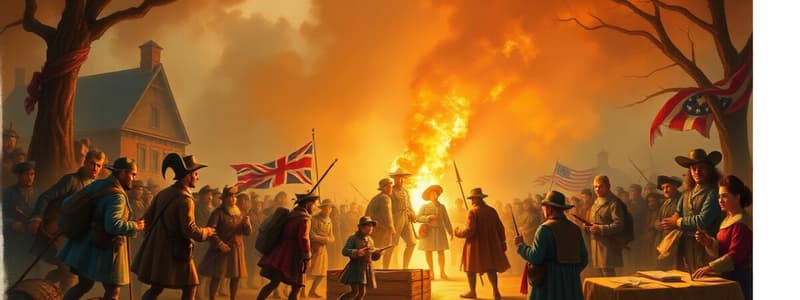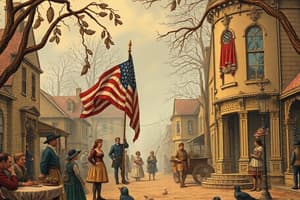Podcast
Questions and Answers
Which of the following acts placed a tax on legal and commercial documents?
Which of the following acts placed a tax on legal and commercial documents?
- Declaratory Act
- Townshend Acts
- Sugar Act
- Stamp Act (correct)
The Writs of Assistance were legal documents that allowed officers to search homes and warehouses for smuggled goods.
The Writs of Assistance were legal documents that allowed officers to search homes and warehouses for smuggled goods.
True (A)
What was the primary outcome of the Boston Massacre trial?
What was the primary outcome of the Boston Massacre trial?
The soldiers were found not guilty.
The ________ Act gave the East India Company the ability to ship tea to the colonies without taxes, effectively monopolizing the tea trade.
The ________ Act gave the East India Company the ability to ship tea to the colonies without taxes, effectively monopolizing the tea trade.
Which of the following groups is correctly matched with its primary role during the colonial era?
Which of the following groups is correctly matched with its primary role during the colonial era?
Match the following colonial acts with their respective years of passage.
Match the following colonial acts with their respective years of passage.
How did the Daughters of Liberty contribute to the colonial resistance movement?
How did the Daughters of Liberty contribute to the colonial resistance movement?
John Adams, the lawyer for the soldiers in the Boston Massacre trial, was a strong advocate for the British Crown and its policies.
John Adams, the lawyer for the soldiers in the Boston Massacre trial, was a strong advocate for the British Crown and its policies.
Flashcards
Sugar Act
Sugar Act
A 1764 act taxing sugar, molasses, and imports; punished smugglers.
Stamp Act
Stamp Act
A 1765 act taxing all legal documents requiring an official stamp.
Stamp Act Congress
Stamp Act Congress
Meeting where colonists decided to boycott British goods until the Stamp Act was repealed.
Declaratory Act
Declaratory Act
Signup and view all the flashcards
Boston Massacre
Boston Massacre
Signup and view all the flashcards
Tea Act
Tea Act
Signup and view all the flashcards
Sons of Liberty
Sons of Liberty
Signup and view all the flashcards
Boycott
Boycott
Signup and view all the flashcards
Study Notes
British Taxation Acts Leading to the American Revolution
-
Sugar Act (1764): Taxed sugar, molasses, coffee, lumber, iron, wine, and other imported goods. Punished smugglers severely.
-
Stamp Act (1765): Taxed all legal and commercial documents. Required an official stamp to prove tax payment.
-
Stamp Act Congress (1765): Colonial representatives in New York agreed to boycott British goods until the Stamp Act was repealed.
-
Declaratory Act (1766): Suspended the earlier act of the British; this act stated it had the right to tax the colonies.
-
Townshend Acts (1767): Taxed imported goods like glass, paper, lead, tea, and wood. Suspended the New York assembly until it agreed to quarter soldiers. Named after British Chancellor of the Exchequer Charles Townshend.
-
Writs of Assistance (1761): Legal documents allowing British officers to search homes and warehouses for smuggled goods.
Events and Reactions
-
Boston Massacre (March 5, 1770): British soldiers fired on a Boston crowd during a protest, fueled by colonists yelling and throwing snowballs.
-
Trial Lawyer (Boston Massacre): John Adams defended the British soldiers.
-
Outcome (Boston Massacre Trial): Soldiers were acquitted.
-
Tea Act (1773): Allowed the East India Company to ship tea to the colonies without taxes, thus monopolizing the tea trade. Colonists responded with boycotts.
Colonial Resistance
-
Sons of Liberty: A group of influential colonists who protested British policies, including the Tea Act. They organized boycotts and argued for the rights of the colonists. The group was made up of lawyers, businessmen, and upper/middle-class professionals.
-
Daughters of Liberty: Women's organization supporting colonial resistance. They encouraged the use of home-spun alternatives to imported goods (like coffee for tea), and learned to weave and make their own clothes.
-
Samuel Adams: A prominent leader of the Sons of Liberty.
-
Boycott: A collective refusal to buy or use certain products or services as a form of protest.
-
Economy: The system of producing, distributing goods and services to fulfill people's wants and needs.
-
Repeal: To revoke or cancel a law or act.
Studying That Suits You
Use AI to generate personalized quizzes and flashcards to suit your learning preferences.




